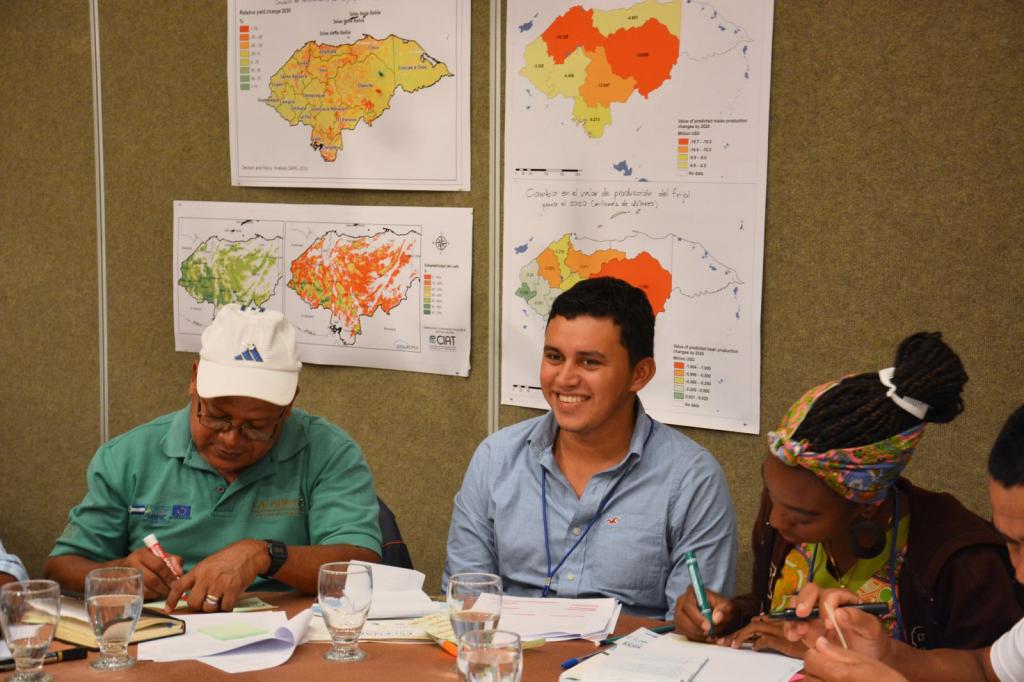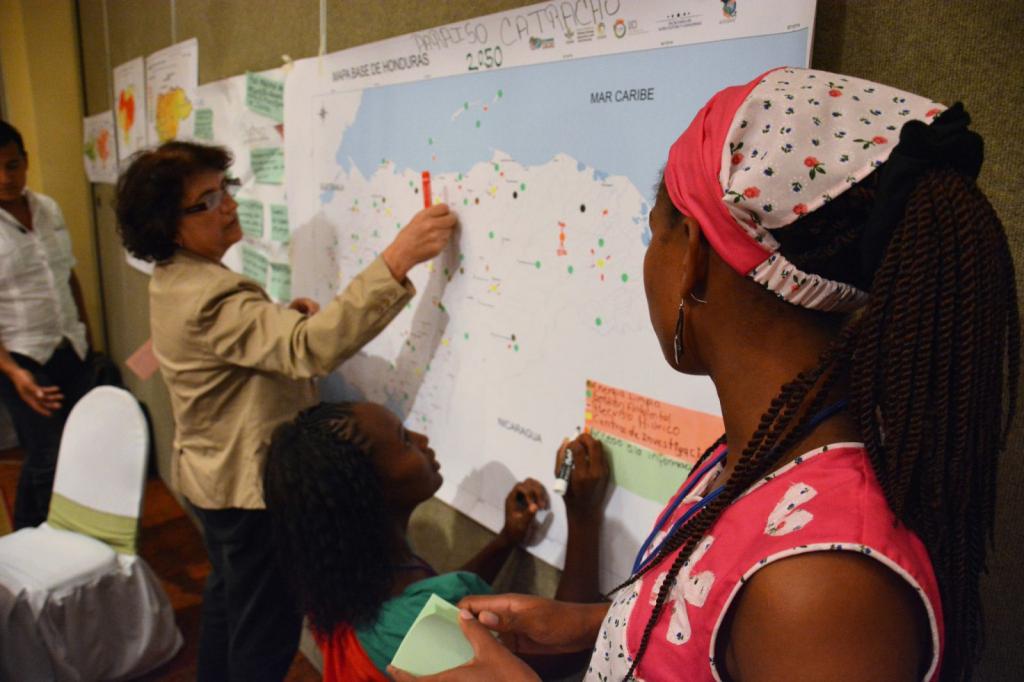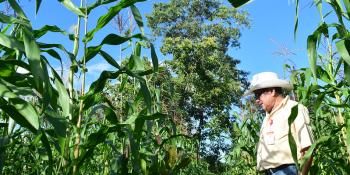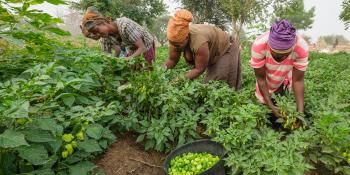Cocoa farmers in Central America learn to plan for a more variable climate

Cocoa farmers from across Central America met up last month to discuss climate impacts and ways forward for their livelihood using scenario-guided planning.
This year we had about a month and a half of drought before the big harvest in May. Our plantations and cocoa beans dried up as there wasn’t enough acidity to ferment them; this made it a low quality product," said Rhina Campos, Quality Supervisor of Conacado Industrial, a cocoa company in Dominican Republic to her group of fellow workshop participants.
Rhina was one of about fifty farm leaders and regional planners attending the workshop "Climate change and future scenarios to guide adaptation plans" in Honduras a few weeks back. The aim was to learn and better understand potential climate change impacts on agriculture and cocoa production in the region, while discussing ways to better prepare for climate variability.
The majority of the attending participants were farmers’ association leaders from either Honduras or other Central American countries, unionised in the Indigenous and Peasant Coordinating Association for Central American Community Agroforestry (ACICAFOC).

Farmers from Central America recently received future scenarios trainings to help create local adaptation plans. Photo: J.L.Urrea (CCAFS)
Our hypothesis is that when farmers explore possible socio-economic changes in their environment, it is easier for them to realize that their life can change; that climate change is not only something that happens to the land¨, said Marieke Veeger, regional coordinator of the Future Scenarios Program for Latin America.
The meeting built on previous work done by the CGIAR Research Program on Climate Change, Agriculture and Food Security (CCAFS) Scenarios team. Last year, the team worked closely with the Honduran Ministry of Agriculture and Livestock (SAG in Spanish) to get the country’s agriculture sector ready for climate change using scenario guided policy planning for their national “Strategy for risk management and climate change adaptation for the sector of agriculture and livestock”.
For this workshop, the focus was on socializing a less technical and more practical, 'popular version' of the national SAG strategy to farmers, using the scenarios methodology as a potential tool to plug in local knowledge and create local adaptation plans," said Marieke Veeger, who is based in Costa Rica at the University for International Cooperation (UCI).
Working with climate scenarios to visualise a plan for action
The workshop facilitators urged the participants to imagine and visualise what Honduras would be like in 20 to 30 years time given a myriad of various socio-economic, environmental and climate-related factors. The groups came up with some very optimistic but also quite pessimistic scenarios for their country.
The idea is to work backwards from these scenarios, especially the scenarios that the country or region would like to attain. Negative scenarios give insight on the obstacles that might be encountered while driving a country towards more climate resilient food systems.
Once you think about the future, and what it might look like given certain unexpected twists of fate, you can start to make plans to get ready for any of these scenarios," says Marieke Veeger.

Through outlining various future scenarios, a country can work backwards to ensure it is on the right track towards its envisioned scenario. Photo: J. L. Urrea (CCAFS LAM)
For me, the most significant value of this approach is the participatory construction of scenarios, which makes people take ownership. Exploring what might happen in their own territory empowers them to plan their future,” said Alberto Chinchilla, executive director of ACICAFOC.
Several of the participants expressed appreciation of the new information, both around the scenario process and what climate change will mean for the region and farming.
Thanks to the workshop, we had the opportunity to validate our strategy and the popular version to smallholder farmers, both men and women, and food sector micro-entrepreneurs. We were able to analyze whether the strategy can be understood by producers and entrepreneurs.
The alliance with ACICAFOC, achieved through the collaboration of UCI and CCAFS was very useful, this experience we are living today with the Future Scenarios workshop gives us a roadmap of how we must continue our work,” said Sonia Gamero, Coordinator for the SAG Climate Change and Risk Management Department.
A survey made during the workshop revealed that the majority of the participating farmers learned something new related to climate impacts and variability that they could use to plan for better cocoa farming and management in the various associations.
Rhina Campos put it like this:
When the producers asked me why my harvest was so bad, I didn’t know what to say because I didn’t understand what was climate change until this workshop. Now I know what it is, what produces it, and what should be done to tackle it.”
“With what I've learned, from this workshop I can now answer the producer and I now have knowledge of how to mitigate these changes."
Through providing participants with both basic climate information and teaching out the Scenario methodology - to think and plan for the future - cocoa farmers in the region is now one step in the right direction to sustainably improve their livelihoods. The ACICAFOC union will also teach and train other farming communities on the new climate and agriculture knowledge that they gathered during the meeting.
Want to learn more? Get in touch with Marieke Veeger (mveeger@uci.ac.cr)
About Future Scenarios
The Scenarios methodology have been developed by the CGIAR Research Program on Climate Change, Agriculture and Food Security (CCAFS), and the Oxford University. It is being implemented in Central America in collaboration with the University for International Cooperation (UCI). The Honduran activities are supported by the Coordinating Association of Indigenous and Community Agroforestry in Central America (ACICAFOC) and the Honduran Ministry of Agriculture and Livestock (SAG).
Download Scenarios flyer: Testing climate and agriculture policy against future scenarios
Learn more about the Honduran process:
- Future scenarios for food security in Central America
- Supporting Honduras in building a more robust strategy for adapting to climate
- Workshop Photos
- Workshop Activities on Storify [In Spanish]
Workshop Media Hits [in Spanish]
- Presenta estrategia hondureña en cambio climático a líderes campesinos de CA
- Productores conocen los efectos del cambio climático
- Cambio climático obligará a sembrar el café cada vez a más altura.
- Other: Terra News, Entorno Inteligente, La Prensa Gráfica, El Espectador, La Prensa Honduras, Pulzo, Noticia al Día, La Tercera, El Espectador, La Hora)
José Luis Urrea is Communications Officer for CCAFS Latin America. Cecilia Schubert is Communications Officer for CCAFS Flagship on Policies and Institutions.


